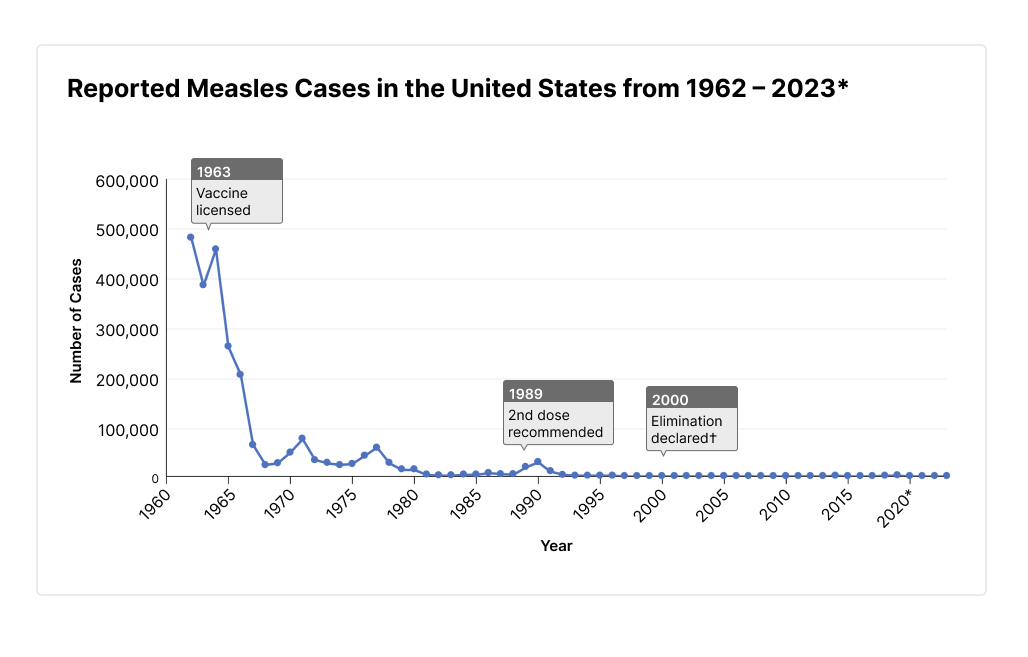ASHEVILLE, N.C. (828newsNOW) — When it comes to preventing measles, it all comes down to the vaccination.
Dr. Rebecca Cramer is a private practitioner in her 10th year at Community Family Practice at 260 Merrimon Avenue.
Dr. Cramer obtained her master’s in public health with a specialization in infectious diseases from Emory University, her Doctor of Medicine degree at the University of Wisconsin and has five years of experience working with immunization efforts in Sub-Saharan Africa.
She is worried about measles.
“You may or may not be aware that there is currently a measles outbreak in west Texas and it has now spread to several states,” Cramer said. “Now we’re seeing cases in New Mexico, Oklahoma and Kansas, and those cases have been genetically linked to the west Texas outbreak. It’s important, because not only is this the largest outbreak we’ve had in many years, but there’s evidence that it is spreading to other adjoining states, which is concerning.”
Background
Measles is a highly contagious virus. According to the Center for Disease Control, “before the measles vaccination program started in 1963, an estimated 3 to 4 million people got measles each year in the United States.”
Out of the reported cases, “400 to 500 died, 48,000 were hospitalized, and 1,000 developed encephalitis,” or brain swelling.
Today, however, measles is virtually nonexistent in the United States. The CDC even declared that measles had been eliminated from the U.S. in the year 2000. This is thanks to the measles vaccine.
“It’s part of a regular childhood vaccination series. It’s the MMR vaccine, measles, mumps and rubella, and children would typically get that at 12 months old and then they would get a booster at kindergarten,” Cramer explained. “That vaccine is over 90% effective at preventing measles and it gives you lifelong immunity against measles.”

In fact, after the booster vaccination, the CDC reports that the MMR vaccine is 97% effective against the measles virus.
The reason for the high and lasting success rate of the vaccine, Cramer said, is that measles is a “stable” virus. Unlike recurring viruses like Covid-19 or the flu, measles is slow to mutate. The virus is consistent, meaning after your booster vaccination shot, protection stays consistent too.
“Our immune system has a long time to see it before it becomes infectious,” Cramer simplified. “So, if you have the vaccine onboard and you have the antibodies against it, theres enough opportunity for your body to see it before it becomes symptomatic.”
Measles and misinformation
Despite the near-eradication of the measles virus in the early 2000s, the virus has begun to creep back as more parents have opted not to vaccinate their children against the disease.
This is a dangerous practice, Cramer warned. The doctor shared that she has encountered a growing misinformation campaign about unsafe ways to protect against measles.
“One of the main things I’ve seen is the idea that if you are healthy and you have a healthy diet, that would either prevent against infection or you would not get as serious of an infection,” Cramer said. “While, of course, it’s really important to invest in your health and eat healthy and exercise and do all those things, that does not actually prevent against an infection from measles.”
Another misinformed methodology for measles prevention is the consumption of Vitamin A.
“Vitamin A is only helpful in individuals who are Vitamin A deficient. In the U.S., we don’t really have that issue, so it doesn’t, in our communities, provide a lot of benefit,” Cramer explained. “In addition, Vitamin A is a fat-soluble vitamin, which means it can be stored up in our bodies. So, if people are taking really high doses of Vitamin A, it can actually become toxic in their body and create other health problems.”
Instead, Cramer urges anyone who has not been vaccinated for measles to do so as soon as possible. The only ineligible people, the doctor said, are babies under six months old or individuals with compromised immune systems, such as someone undergoing certain types of chemotherapy.
Otherwise, getting the vaccine is vital to avoiding the virus.
“For people with healthy immune systems who have not been vaccinated, that would be absolutely the best thing you could do to prevent getting it,” Cramer said. “Because, ultimately, getting vaccinated isn’t just about protecting ourselves. But if I can’t get something, then I can’t give it to somebody else. If I can’t get it, I might be able to protect those babies who are less than six months old.”
For more information about measles, contact your local care physician or read the entry in the Center for Disease Control database.

